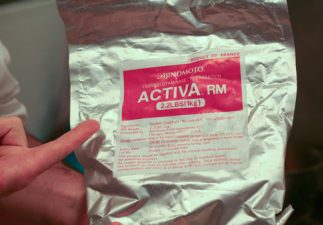 The public was ignorant about the the dangers of smoking till the 1960s. The fashion for meat glue in food seems ominously similar.
The public was ignorant about the the dangers of smoking till the 1960s. The fashion for meat glue in food seems ominously similar.
Finding a scientist to talk about meat glue wasn’t easy. I spoke to neurologists, biologists, pathologists, the head physician at a local hospital, and biochemists. None had even heard of transglutaminase. When I described it and asked if they thought it dangerous to ingest, all gave the same easy answer: “Can’t really see a problem.”
Why were these medical professionals so unconcerned? The answer seems to be, what you don’t know can’t hurt you.
There’s been almost no research on long-term effects of meat glue on living humans. And as I mentioned in our first meat glue post, the one study available to the layman was funded by the manufacturer. How unbiased can that be?
It seems I’d been talking to the wrong people. At length an American bio-inorganic chemist agreed to do some informal research into meat glue, although he had never heard of it either. His conclusion was,
“It’s very scary stuff.”
“Transglutamase is a normal enzyme produced by the body,” said our source. (He prefers to remain anonymous.) “It’s part of our natural healing. It helps blood to clot. But transglutaminase causes an unusual cross–link between lysine and glutamine (two amino acids) in an irreversible chemical reaction. The purpose of this reaction is to keep things in place. In other words, it doesn’t fall apart.“
Following us so far? Meat glue is meant to weld separate substances together. The red light goes on when we consider that it doesn’t decompose – doesn’t metabolize – doesn’t get digested. So once we’ve swallowed it, where does it go? Some must get excreted, of course. But where does the residue circulating in the bloodstream wind up?
“Let’s compare it to Elmer’s Glue versus Crazy Glue,” our source continued. “Elmer’s dissolves if you get it wet. But Crazy Glue is almost impossible to destroy. Transglutaminase can be compared to Crazy Glue, possibly going through the stomach and gut, and resisting digestion. ”
I thought of Chef Dufresene throwing a glued composite of cucumbers and carrots down on a table, watching it bounce, and triumphantly saying, “It’s bullet-proof!” (see our second post about meat glue.) At the time, I thought, who wants to eat something bullet-proof? Now I realized that indestructible has greater implications.
“Transglutaminase might have valuable medicinal applications,” said the chemist. “In wound healing, for example. But like antibiotics, it shouldn’t be added to food indiscriminately. The long-range effects of consuming large amounts of the products of the transglutaminase reaction are not known. People are eating it all the time, though, and lots of it.
“Since I’ve started looking into this, I’ve become aware of how much meat glue really is out there. This doesn’t stand as scientific proof, being an anecdote from my personal experience, but the following story shows why I’ve become convinced that meat glue is dangerous.
“My pre-teen daughter has had joint pain for several years. My wife and I took her to different doctors and specialists and no one could discover the reason.
“Our diet included cheap beef, the kind that has a lot of water when it thaws out. I used to cook it frozen so as not to lose all that flavorful water that I paid for.”
(Another red light: some frozen meat is injected with water to add weight, just as some imported frozen fish. Is this water also meat glue slurry? How can we know, if the law doesn’t require it to be listed on the label?)
“The meat retained its nice cubic shape after long stewing. Even if I cut the meat into smaller cubes, it kept its shape. Long-cooked meat should fall apart, not stay in cubes. With my recent research into transglutaminase fresh in mind, I concluded that the meat had been glued. I stopped buying it.
“Once that meat was eliminated from the family diet, the pain in my daughter’s arms stopped. She has considerable relief from pain in her legs too. No other factors have changed in her life.
” I won’t be buying that meat again. I strongly suspect that although transglutaminase isn’t listed in the ingredients, meat glue is what keeps those convenient cubes together. And when you think of it, cooking it at home is done just the way the food industry does it. Glue the meat, wrap it in plastic and chill it for several hours, then slice it into any shape you want. The customer picks it up already processed, in its plastic wrapping. All that’s left is to cook it.”
Even vegetarians may be exposed to meat glue and not know it. The food industry uses it to thicken yogurt and create new kinds of pastas. Where else does meat glue show up that we don’t know about? And why is no one talking about it?
Ignorance is dangerous. Take smoking. According to Wikipedia, “In 1964, the Surgeon General of the United States released the Surgeon General’s Advisory Committee Report on Smoking and Health. It was based on over 7000 scientific articles that linked tobacco use with cancer and other diseases.” Yet ads recommending tobacco for pleasure and even health benefits had been encouraging smoking since 1868. A century.
How long are you going to wait to find out if your food contains transglutaminase, and what it might be doing to your health?
Time to demand independent research on meat glue, now.
More substances you should know about on Green Prophet:
:: Wikipedia
Image of early cigarette ad from Lane Medical Library Digital Document Repository




Thanks Betsy. I think this is a technical glitch being caused by one of the plugins we are using. We are trying to resolve it.
This article has a broken link on “I’d” (in the sentence “It seems I’d been talking to the wrong people.”) and it goes to https://d/ — Did you intend to link to another resource, perhaps?
Excellent example with the “More doctors smoke Camel” cigarette ad! Just because certain “experts” think something is safe, doesn’t mean it is. (Another example: All the natural-gas-fracking experts who say the nearby water is safe, yet they refuse to drink it when offered.)
Thank you, Miriam! I appreciate the information. Very good article, by the way, and definitely another reason to not consume meat. 😉
Kathryn, it’s a perfectly logical question, and you’re right on track. The chemist was protecting his identity because of job security.
I hope this will not sound skeptical or harsh, but I must ask: Why did the source prefer to remain anonymous? Fear of ridicule from the scientific community, or does said person work for a company that would likely fire him or her should a name be revealed? (For the record, I am Vegan and do care about what goes into my food.)
Andrew, there’s nothing to indicate the presence of transglutaminase in any product – since it’s FDA approved as safe. No e-number, no nothin’. You won’t find it in your fresh fruit and veg, obviously, nor in your bulk grains. Can’t answer for any processed food you may buy.
Is that an e-number? I’m a vegan, but I don’t fancy finding that in some food item of mine.
Chances are if you eat meat, you don’t really care about your health or what’s in your food/what you put in your body. It’s blood, secretions, and rotting flesh. What a lil meat glue added to the mix? Go vegan.
I agree a lot of people don’t care what they injest but they do care about the kind of oil they put in their car. I dont have the stomach for meat or the chemicals they add to it and I have say leave the animals alone. The cruelty alone should make a person avoid it at all costs. I guess I dont really care what they put in it because I wont eat it anyway. Go vegan.
Murtaza, thanks for the kind words. I hope people wake up to meat glue and start demanding to know more about it.
Wow, what an excellent article! Miriam, when you failed to find original research on this topic, you apparently *got* someone to do some research to learn more about it. Your genuine sleuthwork is inspiring, and offers a model that other journalists should perhaps take up.
Great thanks too to the anonymous researcher who offered his assessments, even though they may be only informal and anecdotal! 🙂